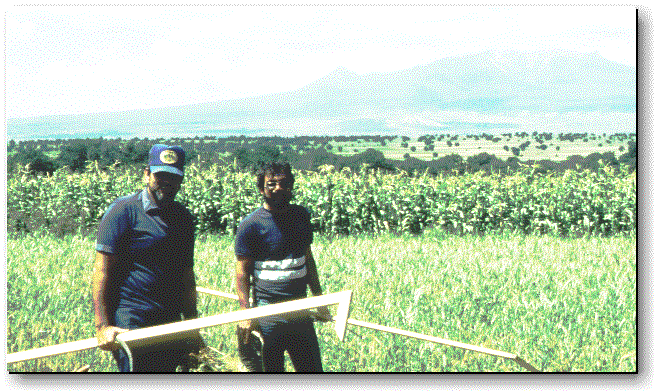

Kenneth Dean Sayre Wheat Program
Wheat Production Research CIMMYT
(pictured with Jaime Cruz, right)
ACADEMIC BACKGROUND
Ph.D. Plant Breeding, Cornell University, 1971
B. S. Crop Science, Colorado State University, 1967
PROFESSIONAL EXPERIENCE
November 1985 - present: Wheat agronomist, Centro Internacional de
Mejoramiento de Maiz y Trigo (CIMMYT) based in Mexico.
March 1980 - November 1985: Cropping System Agronomist based in Nepal with IADS/Winrock
International.
May 1978 - March 1980: Manager, Sayre's Farms Incorporated, Delta, Colorado.
February 1977 - March 1978. Tropical Forage Legume Breeder, Centro Internacional de
Agricultural Tropical (CIAT), based in Cali, Colombia.
March 1974 - February 1977: Head, Department of Plant Physiology, Centro Internacional de
la Papa (CIP), based in Lima, Peru.
October 1971 - March 1974: Post-doctoral assignment with the Rockefeller Foundation to the
International Potato Program, based in Toluca, Mexico.
PROFESSIONAL ACTIVITIES
Member of the American Society of Agronomy and Crop Science Society of America
RECENT PUBLICATIONS
Reynolds, M.P., K.D. Sayre and H.E. Vivar. 1994. Intercropping wheat and barley with N-fixing legume species: a method for improving ground cover, N-use efficiency and productivity in low input systems. J. Agric. Sci. 123:173-183.
Lawn, D.A., and K.D. Sayre. 1992. Soilborne pathogens on cereals in a highland location of Mexico. Plant Dis. 76(2):149-154.
Sayre, K.D. 1983. Variety development, variety maintenance and breeder and foundation seed production of maize in Nepal. Seed program development strategy. Min. of Agric, His Majesty's Government of Nepal, 157-160.
Crossa, J., P.L. Cornelius and K.D. Sayre. 1995. A shifted multiplicative model fusion method for grouping environments without cultivar rank change. Crop Sci. 35:54-62.
Traxler, G., J. Falck-Zepeda, I.J. Ortiz-Monasterio and K. Sayre. 1995. Production risk and the evolution of varietal technology. Am. J. Agric. Econ. 77:1-7.
RESEARCH FOCUS
Improvement in agricultural production systems for resource
constrained farmers in the developing world. Development of more sustainable cropping
systems through integration of proper crop production strategies with appropriate
germplasm.